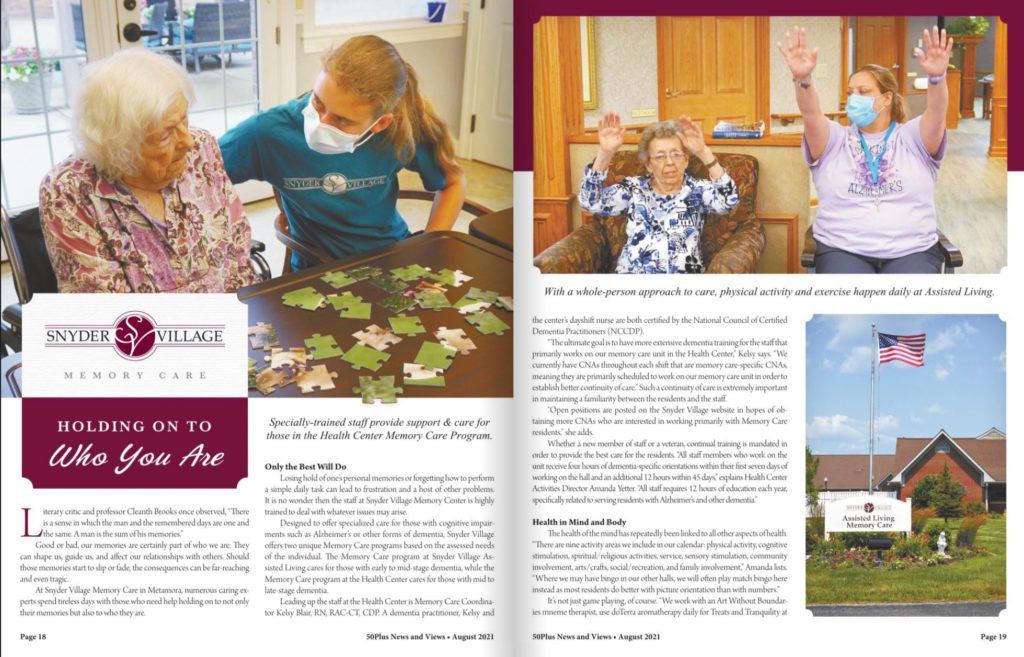(As written in the August Issue of 50 Plus News and View Magazine – Greater Peoria Area Edition)
By Alexander Germanis
Literary critic and professor Cleanth Brooks once observed, “There is a sense in which the man and the remembered days are one and the same. A man is the sum of his memories.”
Good or bad, our memories are certainly part of who we are. They can shape us, guide us, and affect our relationships with others. Should those memories start to slip or fade, the consequences can be far-reaching and even tragic.
At Snyder Village Memory Care in Metamora, numerous caring experts spend tireless days with those who need help holding on to not only their memories but also to who they are.
Only the Best Will Do
Losing hold of one’s personal memories or forgetting how to perform a simple daily task can lead to frustration and a host of other problems. It is no wonder then the staff at Snyder Village Memory Center is highly trained to deal with whatever issues may arise.
Designed to offer specialized care for those with cognitive impairments such as Alzheimer’s or other forms of dementia, Snyder Village offers two unique Memory Care programs based on the assessed needs of the individual. The Memory Care program at Snyder Village Assisted Living cares for those with early to mid-stage dementia, while the Memory Care program at the Health Center cares for those with mid to late-stage dementia.
Leading up the staff at the Health Center is Memory Care Coordinator Kelsy Blair, RN, RAC-CT, CDP. A dementia practitioner, Kelsy and the center’s dayshift nurse are both certified by the National Council of Certified Dementia Practitioners (NCCDP).
“The ultimate goal is to have more extensive dementia training for the staff that primarily works on our memory care unit in the Health Center,” Kelsy says. “We currently have CNAs throughout each shift that are memory care-specific CNAs, meaning they are primarily scheduled to work on our memory care unit in order to establish better continuity of care.” Such a continuity of care is extremely important in maintaining a familiarity between the residents and the staff.
“Open positions are posted on the Snyder Village website in hopes of obtaining more CNAs who are interested in working primarily with Memory Care residents,” she adds.
Whether a new member of staff or a veteran, continual training is mandated in order to provide the best care for the residents. “All staff members who work on the unit receive four hours of dementia-specific orientations within their first seven days of working on the hall and an additional 12 hours within 45 days,” explains Health Center Activities Director Amanda Yetter. “All staff requires 12 hours of education each year, specifically related to serving residents with Alzheimer’s and other dementia.”
Health in Mind and Body
The health of the mind has repeatedly been linked to all other aspects of health. “There are nine activity areas we include in our calendar: physical activity, cognitive stimulation, spiritual/religious activities, service, sensory stimulation, community involvement, arts/crafts, social/recreation, and family involvement,” Amanda lists. “Where we may have bingo in our other halls, we will often play match bingo here instead as most residents do better with picture orientation than with numbers.”
It’s not just game playing, of course. “We work with an Art Without Boundaries mneme therapist, use doTerra aromatherapy daily for Treats and Tranquility at bedtime, as well as in the afternoons for an extra energy boost,” Amanda says. “And we have a wonderful therapy department that provides skilled therapy, as well as restorative and rehab (maintenance) programs.”
The Snyder Village Memory Care programming is ability-activity based, requiring the residents to participate in four different activities per day to the best of their abilities. Because not every resident lives with the same stage of dementia, interventions and accommodations need to vary as well. But each resident’s abilities can change on a weekly, daily, or even hourly basis, meaning the staff needs to be able to adapt at a moment’s notice.
Safe and Secure
Since a major concern regarding dementia residents is their security, nurses and CNAs in Snyder Village’s Memory Care are on-staff 24/7 in order to ensure the continual supervision. “Frequent rounding is done throughout the day and night for residents who are in their rooms to assess for safety and intervene in potential unsafe situations,” Kelsy assures.
Maintaining a secure campus is of equal importance. Secured with a code for exit, the community’s layout is specifically designed to support the residents’ functioning. Even access to the patio doors is secured with locks and alarms to assure residents are always under the watchful care of staff.
The outdoors are certainly not off limits, of course. Both the Health Center and Assisted Living have designated, secured outdoor space for residents to enjoy. “Staff members are able to take residents out to the patio at any time if they desire to do so even when outdoor activities are not scheduled,” Kelsy says.
“In the enclosed courtyard at Assisted Living are raised planting beds, a large wooden swing, tables and chairs, a gazebo in the center of a grass area, and a circular perimeter walkway,” describes Snyder Village Assistant Director Amy Dorcy.
Even the overall layouts of the Memory Care units differ from other areas of the Health Center and Assisted Living in order to accommodate and maximize the functional abilities of the residents.
Varied Levels of Care
Unfortunately, regardless of the stage of dementia an individual might be living with currently, it is unlikely to remain at that stage indefinitely. As a resident’s dementia progresses they will then require more advanced levels of attention and care, which is possible with Snyder Village’s multi-level programs of care.
“Although the physical and cognitive abilities of our residents encompass a broad range, we are seeing more residents being admitted later in their disease process,” shares Amanda. “Moderate to severe cognitive impairment usually results in a much higher level of assistance, such as feeding assistance, transfer/ambulation assistance, bathing/dressing/grooming, etc. Many will eventually require mechanical assistance for transfers as their disease progresses.”
The staff must adapt to this progression. That adaptation can come in the form of helping with ADLs, or activities of daily living. Tasks may include helping a resident walk, repositioning them in bed, helping them eat, use the bathroom, bathe, or get dressed. “The residents are encouraged to perform as much of each task as they can safely do so themselves in order to maintain their abilities to perform the task,” Kelsy explains. “Therapy services are available on site and referrals to therapy are made when a decline in ability to perform is noted in any aspect of a resident’s physical abilities. Therapy will then evaluate and treat the resident in order to try to restore their abilities back to their previous baseline.”
Set Apart
Whether a resident only needs assisted living or their needs increase, they will still have a home at Snyder Village. A transition to the Health Center means they can remain on the same campus. “This creates a smooth transition for our residents,” Kelsy says, “which is extremely important especially for our Memory Care residents, as communication between our Assisted Living and Health Center staff is able to be more extensive on an ongoing basis as needed.”
Although that continuity of care already sets Snyder Village apart, Amy mentions that numbers play a further significant part in making Snyder Village a top choice. “We have a small population and a great resident to staff ratio at 10 residents to one staff member and that staff is dedicated to working in memory care.”
Of all the maladies that plague mankind, among the cruelest are those affecting one’s memory. While there is, as of yet, no cure for dementia, it is heartening to know there are so many individuals at Snyder Village Memory Care who dedicate their lives to help those who are suffering. It is their mission to help the residents in their care stay connected to their loved ones, themselves, and their dignity.
Learn more about Snyder Village’s Memory Care programs by contacting Kim Linehan, Admission Liaison, at (309) 366-4132 or [email protected]. View photos, amenities, and more here.





